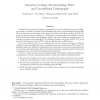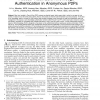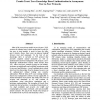93 search results - page 13 / 19 » Unifying Zero-Knowledge Proofs of Knowledge |
EUROCRYPT
1999
Springer
13 years 12 months ago
1999
Springer
Abstract. We present the first efficient statistical zero-knowledge protocols to prove statements such as: – A committed number is a prime. – A committed (or revealed) number ...
CRYPTO
2010
Springer
13 years 8 months ago
2010
Springer
Motivated by the question of basing cryptographic protocols on stateless tamper-proof hardware tokens, we revisit the question of unconditional two-prover zero-knowledge proofs fo...
TPDS
2008
13 years 7 months ago
2008
Most trust models in Peer-to-Peer (P2P) systems are identity based, which means that in order for one peer to trust another, it needs to know the other peer's identity. Hence,...
IPPS
2007
IEEE
14 years 1 months ago
2007
IEEE
Most of the current trust models in peer-to-peer (P2P) systems are identity based, which means that in order for one peer to trust another, it needs to know the other peer’s ide...
ASIACRYPT
2001
Springer
14 years 4 days ago
2001
Springer
The number of communication rounds is a classic complexity measure for protocols; reducing round complexity is a major goal in protocol design. However, when the communication time...



